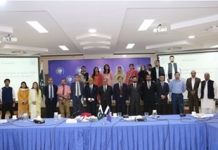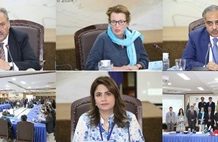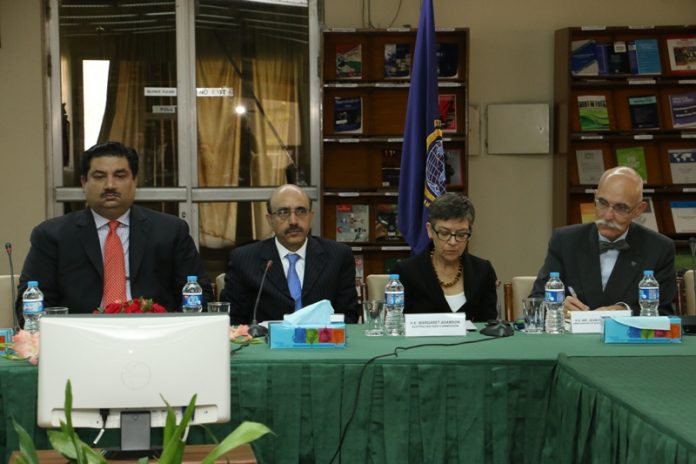Press Release
“Pakistan-Afghanistan Cooperation on Trade: Political
Economy Analysis”
March 21. 2016
The Institute of Strategic Studies, Islamabad organised a roundtable discussion today on a report prepared by Dr. Mohammad Zubair Khan, former federal minister for commerce titled “Pakistan-Afghanistan Cooperation on Trade: Political Economy Analysis”. The Chief Guest on the occasion was Eng. Khurram Dastagir, Federal Minister for Commerce. Other distinguished speakers at the occasion included; Mr. Javed Ghani, Director General, Customs, Transit and Trade; Mr. Mansoor Ahmad Khan, Director General (Afghanistan &ATDC), Ministry of Foreign Affairs; Mr. Akhlaq Ahmad Khattak, Chief Customs, F&C, Federal Board of Revenue, Islamabad; Ambassador (Retd.) Ayaz Wazir, and Dr. Mansoor Akbar Kundi, Professor (Meritorious), Department of International Relations, International Islamic University, Islamabad.Eng. Khurram Dastagir in his remarks stated that Pakistan has always been supportive of trade with Afghanistan, and even supported the latter’s entry into the World Trade Organisation. He acknowledged the tensions that exist with regard to trade facilitation with Afghanistan. He said that positivity exists between leaders on both sides, but there has to be a strong mutual agreement in place. He went on to say that Pakistan Railways will begin to play a more prominent role in the movement of goods and that the government has also started working on moving the country towards regional economic cooperation. Eng. Dastagir also stated that Pakistan would welcome an agreement with the Central Asian States. He mentioned the two ongoing projects: CASA-1000 and the TAPI pipeline project. He emphasised that regional peace can be achieved through economic cooperation and given the good will that exists between the countries; the prospects of this were very high.
Eng. Khurram Dastagir in his remarks stated that Pakistan has always been supportive of trade with Afghanistan, and even supported the latter’s entry into the World Trade Organisation. He acknowledged the tensions that exist with regard to trade facilitation with Afghanistan. He said that positivity exists between leaders on both sides, but there has to be a strong mutual agreement in place. He went on to say that Pakistan Railways will begin to play a more prominent role in the movement of goods and that the government has also started working on moving the country towards regional economic cooperation. Eng. Dastagir also stated that Pakistan would welcome an agreement with the Central Asian States. He mentioned the two ongoing projects: CASA-1000 and the TAPI pipeline project. He emphasised that regional peace can be achieved through economic cooperation and given the good will that exists between the countries; the prospects of this were very high.
Dr. Zubair spoke about how trade between Afghanistan and Pakistan is multi-dimensional and has been the subject of political debate, negotiations and bilateral agreements, but also a source of tensions. He said that for Pakistan, the development of trade links with Afghanistan acquires somewhat of an enhanced importance in the regional context. Moreover, the potential of the Central Asia Regional Economic Cooperation (CAREC) programme puts regional trade relations for both Pakistan and Afghanistan on a much larger scale, together with funding from multilateral institutions that can convert economic potential into reality in the medium term. In the near-term, the emerging security situation in Afghanistan will be critical for improving access of Central Asian countries to global markets and for Pakistan to reach the CAREC markets. Dr. Zubair emphasised that it was important to adopt international best practices and address difficulties in the context of the institutional and legal framework of international commitments of Pakistan and Afghanistan and through formal structured negotiations through Customs Convention on the International Transport of Goods (TIR Convention). Trade facilitation reform in Afghanistan and Pakistan can be undertaken with technical assistance from multilateral organisations. Transit trade can move smoothly and illegal trade can be reduced by improving border procedures, strengthening the bonded transport and guarantee system, and building the institutional and financial apparatus to implement the TIR Convention system. A strong TIR apparatus is very important for the China-Pakistan Economic Corridor (CPEC) as well, he added.
Ambassador Masood Khan, Director General ISSI in his remarks said that Dr. Zubair had produced a seminal report which had triggered a timely debate on the issue surrounding Pak-Afghan trade. Ministries of Commerce and Foreign could benefit from his report and the Federal Board of Revenue could refine operational aspects in the light of Dr. Zubair’s observations and insights. From Pakistan’s point of view he said, the issue of the Pak-Afghan border was settled. It is an internationally recognised border. However, since Afghanistan had some political difficulties in forthrightly acknowledging this reality, Pakistan and Afghanistan should work on co-management of the border for which Afghanistan was willing to cooperate. In regard to transit trade, he said available spaces should be used optimally through reform and redress of deficits. Ambassador Masood Khan cautioned that Afghanistan-India trade would remain restricted for some time to come until all related issues are resolved satisfactorily. The high volume of illicit trade – in arms, narcotics and humans – was hurting both Afghanistan and Pakistan and must be eliminated through active collaboration between the two countries. This was not an easy task, but coordinated efforts would gradually make a difference. It is time, he said, for FATA to have a fully represented and constitutional status within Pakistan. Ultimately, the realisation of the whole potential of Pakistan-Afghanistan trade would depend on creation of conditions of peace and stability for which Pakistan has been making resolute efforts.
The speakers stated that the report has made a very valuable contribution in the areas it has covered. They agreed that illegal smuggling is a major source of income for people living along the border. Though things have significantly improved, the trust and peace deficits are handicapping a number of efforts made by the Pakistani government. It was suggested that besides the main entry points, the almost 262 unfrequented routes need to be monitored as well. For this, the Government of Pakistan has taken important steps such as implementing real time monitoring through computerised systems. Pakistan Customs have introduced paperless clearances, devising multiple policies on tariff rationalisation, and have also put in place a special committee dealing with every day issues in Pak-Afghan trade. Proof that Pakistan is facilitating Afghan cargo can be seen in the increase of container shipment between the two countries from 40,000 trucks in 2014 to 50,000 trucks in 2015. Over the years, Pakistan Customs has taken many steps to eliminate trade challenges. In 2013, a Directorate General Transit Trade was set up, including Mobile Enforcement Units (MEUs) to safeguard en-route cargo. All speakers lay emphasis on the setting up of a strong TIR System of Transit and an Integrated Transit Trade Management System (ITTMS). The importance of doing so has increased because of the implementation of the China-Pakistan Economic Corridor (CPEC). The CPEC also means the opening up of more economic revenues; hence the importance of Afghanistan cannot be ignored. They emphasised that Pakistan needs to focus on increasing competitiveness in its industry by strengthening institutional linkages, putting in place effective mutual facilitation programmes, making banking channels more effective and further developing connectivity projects. Moreover, the Federal Board of Revenue (FBR) Pakistan needs to work hand-i- hand with its Afghan counterpart. One suggestion given was that Afghanistan should apply a tax on all transit goods at least at par with the tax levied by Pakistan. This will ensure that the probability of the same goods re-entering Pakistan is reduced. Another important suggestion raised was that reform and development in border areas such as FATA were essential for developing trade with Afghanistan.
The Chairman Board of Governors ISSI, Ambassador Khalid Mahmood in his concluding remarks stated that the discussion on the report was very useful. He said that practical steps are being taken to facilitate bilateral trade and it is for the two countries to harmonise their interests; the interest of Afghanistan is to have free transit and the interest of Pakistan is to see this right is not abused.
Arhama-21032016












